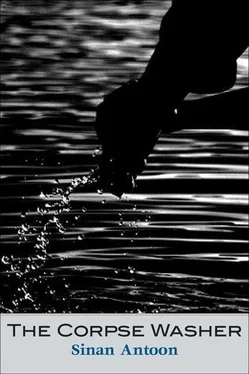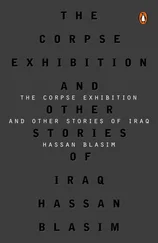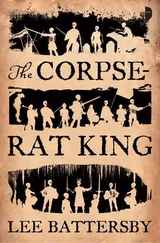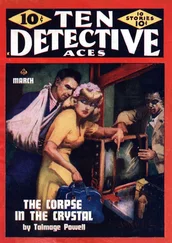“I told my cousin about all these nightmares and the insomnia that ruined my days. He advised me to go to the mosque and pray. He was right, because prayer saved my mind and soul from the madness erupting all around me. Those dogs and the nightmares didn’t disappear entirely, but they would return only once every six months or so. You asked about burying corpses, but the roots of all of this kept haunting me. I was assigned to work at the Ministry of Health. Through my job, I heard about the bodies abandoned at the morgue and other places because no one claimed them or bothered to bury them for whatever reason. That broke my heart. I told many friends and acquaintances about it. I knew there was a government cemetery, the Muhammad Sakran Cemetery, where the unknown were buried. I faced many obstacles at first when I started this project, but many do-gooders helped me out with donations and that’s how it all started.”
He asked whether I had changed my mind about working at the mghaysil, and I said that I hadn’t. “God will reward you, you know,” he assured me. I didn’t respond, but asked him whether the dogs and nightmares were now leaving him in peace.
He laughed. “They left me alone, because they were afraid of what they saw in my other nightmares.”
“What happens in these other nightmares?”
He laughed again: “I’ll tell you some other time.”
I’m walking in a public garden in Baghdad. I think I must have visited it a long time ago, since I recognize the path which goes through it and circles around the fountain. The fountain stands in the middle like a huge flower with petals of water. But I don’t recall ever seeing so many white statues on the lawn: men, women, and children standing, sitting, or lying on the ground. The sky is ink blue and every now and then the moon hides behind flocks of clouds driven by the wind to an unknown fate. The wind appears to have moved one of the statues of a man, which stoops as if to look for something he’s lost. I think I hear a groan. I approach the statue and the groans grow louder. I discover that the statue is shrouded in white. When I get closer, I hear a male voice begging me to sprinkle water on it.
“Who are you and why are you stooping like that,” I ask.
“This is how I was when I died and I cannot move. Please, take me to the water, because I’m suffering.”
I hold the figure by its shoulders, which are very cold, and drag it toward the fountain. I place it at the fountain’s edge so that the water will spray the statue’s head. The voice sighs and asks me to push it into the fountain’s waters. I do. Before comprehending what has happened, I hear another groan and a voice saying “Me too, please.”
Nine months before Hammoudy’s disappearance, my mother started feeling severe pain in her stomach and was throwing up all the time. I took her to the doctor, who ordered numerous tests and prescribed some medicine. Her situation only got worse so I took her to a different doctor, who repeated the tests and then said she should have a colonoscopy. It turned out that she had a growth, but the biopsy determined that it wasn’t malignant. It had to be removed, and the surgery went well. She was almost fully recovered when she got a severe infection and had to go back to the hospital for a month. The doctors’ bills and the surgery and hospital expenses depleted everything I had saved from the money Hammoudy had given us every month. I had to borrow from my brother-in-law to pay the bills and cover other expenses. All my attempts to find a job failed. Job hunting in Baghdad had itself become a confounding quest through a labyrinth of checkpoints and walled neighborhoods.
The debts piled up. I was at wit’s end and felt cornered, especially after Hammoudy’s disappearance, which, aside from the deep emotional distress it caused, meant no steady income. Al-Fartusi came again to try to convince me to take up my father’s work. He said it was not right to keep the mghaysil closed and urged me to open it and go back to work. He reminded me that the living had a debt and a responsibility to the dead. I didn’t say no right away, and perhaps he felt that I was considering it, and that he had finally found a breach in my wall to dig through.
“You know that I’m not religious.”
“It doesn’t matter. What matters is intention.” He invoked the Qur’an again. “Piety does not consist in turning your faces toward the east or west.
“There are corpses scattered all over the streets and stuffed in fridges. If you purify them and shroud them, God will love you and forgive all your sins whether you pray or not. Plus, trust me, your father will be so pleased and his soul will be at rest in paradise.”
“But I haven’t washed in years and I may have forgotten all the details.”
He smiled, as if sensing his victory, and said: “I don’t believe you, but I can give you a book that contains every detail you need to know about the rules and rituals of washing and shrouding.”
I don’t know why I agreed. It was primarily the need for money, of course. I convinced myself that this would only be a temporary solution until I found a job or some other source of income. I never thought that I would keep on washing for months and years. Was there a mysterious force taking me back to the mghaysil ? Did you have something to do with it, Father? Are you happy now?
Al-Fartusi hugged me and patted my shoulders before saying goodbye. He said he would get in touch with Mahdi, Hammoudy’s nephew who’d been working with him, and tell him that the mghaysil would open again.
I see Reem standing in an orchard full of blossoming pomegranate trees. The wind moves the branches and the red blossoms appear to be waving from afar. Reem waves as well and her hands say: Come close! I walk toward her and call out her name, but I can hear neither my own voice nor the sound of my footsteps. All I hear is the wind rustling. Reem smiles without saying anything. I am much closer and I see two pomegranates on her chest instead of her breasts. She notices that I am looking at them and smiles as she cups them with her hands from below. Her fingernails and lips are painted pomegranate red. I rush toward her, and when I reach her and hug her, the left pomegranate falls to the ground. When I bend down to pick it up, I see red stains bathing my arm. I turn back and see Reem crying as she tries to stop the fountain of blood gushing from the wound.
“If your father were alive, he would be very happy.”
My mother chattered excitedly as she prepared the sufurtas which she insisted I take to work with me, even though I had told her the night before that I would buy my lunch from one of the shops and that she shouldn’t bother.
“Why would you want to eat outside food, son? Is there anything better than your mother’s homemade food? I packed some chicken stew with potatoes and rice for you.”
She was very pleased that I was going back to Father’s work. I didn’t tell her that the only reason was to be able to pay all the debts from her illness. She kissed me on the forehead and enlisted “God, Muhammad, and Ali” to accompany me and protect me.
Mahdi was slouching against the wooden door of the mghaysil with his knee bent and his right heel on the door itself. His hands were clasped over his chest. He was fifteen, with very short brown hair, hazel eyes, and thick eyebrows. His nose was big, and fuzz had already started to appear above his lips and on the sides of his face. He was thin, but with broad shoulders and a strong frame, which enabled him to lift bodies. He was wearing black sneakers, jeans, and a black jacket over a red-and-blue striped jersey with “Barcelona” written on the front.
Читать дальше












